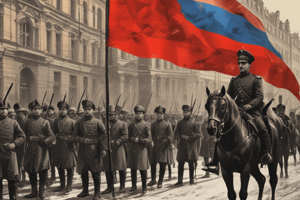Podcast
Questions and Answers
What is the definition of History?
What is the definition of History?
The study of past human events, societies, and cultures to understand the present and inform the future.
What were the three main causes of the Russian Revolution?
What were the three main causes of the Russian Revolution?
Poverty and inequality, World War I, and the Tsarist regime
What was the February Revolution of 1917?
What was the February Revolution of 1917?
Mass protests and strikes led to the abdication of Tsar Nicholas II
Who led the Bolsheviks in the October Revolution of 1917?
Who led the Bolsheviks in the October Revolution of 1917?
What was the outcome of the Russian Civil War (1918-1922)?
What was the outcome of the Russian Civil War (1918-1922)?
What was the significance of the Russian Revolution?
What was the significance of the Russian Revolution?
Flashcards are hidden until you start studying
Study Notes
History
- Definition: The study of past human events, societies, and cultures to understand the present and inform the future.
- Scope: Encompasses various disciplines, including archaeology, anthropology, economics, geography, politics, and sociology.
- Methods: Historians use primary and secondary sources, such as documents, artifacts, and oral testimonies, to reconstruct and analyze the past.
Russian Revolution
- Causes:
- Poverty and inequality: Widespread poverty, inequality, and discontent among the Russian people.
- World War I: Russia's disastrous participation in WWI led to food shortages, inflation, and military defeats.
- Tsarist regime: Autocratic rule of Tsar Nicholas II, who was seen as ineffective and out of touch with his people.
- Events:
- February Revolution (1917): Mass protests and strikes led to the abdication of Tsar Nicholas II.
- Provisional Government: A temporary government established, led by Alexander Kerensky.
- October Revolution (1917): Bolsheviks, led by Vladimir Lenin, seized power in a coup.
- Consequences:
- Establishment of the Soviet Union: The world's first socialist state, with Lenin as its leader.
- End of the Romanov dynasty: The Russian monarchy was abolished.
- Russian Civil War (1918-1922): Bolsheviks fought against the anti-communist White Army.
History
- Study of past human events, societies, and cultures to understand the present and inform the future
- Encompasses various disciplines such as archaeology, anthropology, economics, geography, politics, and sociology
- Historians use primary and secondary sources, including documents, artifacts, and oral testimonies, to reconstruct and analyze the past
Russian Revolution
Causes
- Widespread poverty and inequality among the Russian people
- Russia's disastrous participation in World War I led to food shortages, inflation, and military defeats
- Autocratic rule of Tsar Nicholas II, who was seen as ineffective and out of touch with his people
Events
February Revolution
- Mass protests and strikes led to the abdication of Tsar Nicholas II in 1917
- Temporary government established, led by Alexander Kerensky
October Revolution
- Bolsheviks, led by Vladimir Lenin, seized power in a coup in 1917
Consequences
- Establishment of the Soviet Union, the world's first socialist state, with Lenin as its leader
- End of the Romanov dynasty, with the Russian monarchy abolished
- Russian Civil War from 1918-1922, in which Bolsheviks fought against the anti-communist White Army
Studying That Suits You
Use AI to generate personalized quizzes and flashcards to suit your learning preferences.




